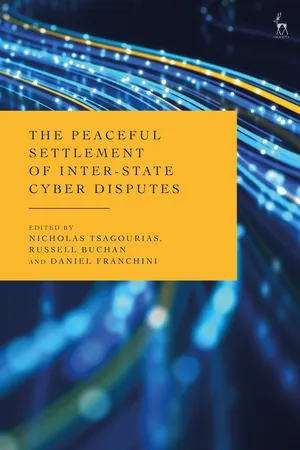
The Peaceful Settlement of Inter-State Cyber Disputes
- 344 pages
- English
- ePUB (mobile friendly)
- Available on iOS & Android
The Peaceful Settlement of Inter-State Cyber Disputes
About this book
With cyberspace becoming a domain of inter-state conflict and confrontation, this book is one of the first studies of the ways in which international law can facilitate the peaceful settlement of inter-state cyber disputes. By employing theoretical and practical inquiries and analysis, the book examines the legal parameters of cyber dispute settlement; explores critical questions about the role of dispute settlement institutions and methods; and identifies and addresses related challenges. The book begins by considering the legal definition of a cyber dispute and the scope of the good faith obligation of states in settling their cyber disputes peacefully. It then examines the role of certain institutions (International Court of Justice, national courts, the EU, the Security Council) and methods (judicial, diplomatic, countermeasures, arbitration, conciliation, fact-finding) in the settlement of cyber disputes. It also discusses how data disputes can be settled and whether new and specialised mechanisms are needed. The book provides scholars, practitioners and law students with immediate knowledge and understanding of the role of international law in the peaceful settlement of cyber disputes, as well as how international dispute settlement as a discipline and practice can apply to this new field.
Frequently asked questions
- Essential is ideal for learners and professionals who enjoy exploring a wide range of subjects. Access the Essential Library with 800,000+ trusted titles and best-sellers across business, personal growth, and the humanities. Includes unlimited reading time and Standard Read Aloud voice.
- Complete: Perfect for advanced learners and researchers needing full, unrestricted access. Unlock 1.4M+ books across hundreds of subjects, including academic and specialized titles. The Complete Plan also includes advanced features like Premium Read Aloud and Research Assistant.
Please note we cannot support devices running on iOS 13 and Android 7 or earlier. Learn more about using the app.
Information
Table of contents
- Cover
- Title Page
- Foreword
- Contents
- Contributors
- Abbreviations
- Table of Cases
- Table of Statutes
- Table of International Instruments
- Introduction
- PART I: CONCEPTS
- PART II: INSTITUTIONS
- PART III: METHODS
- Index
- Copyright Page